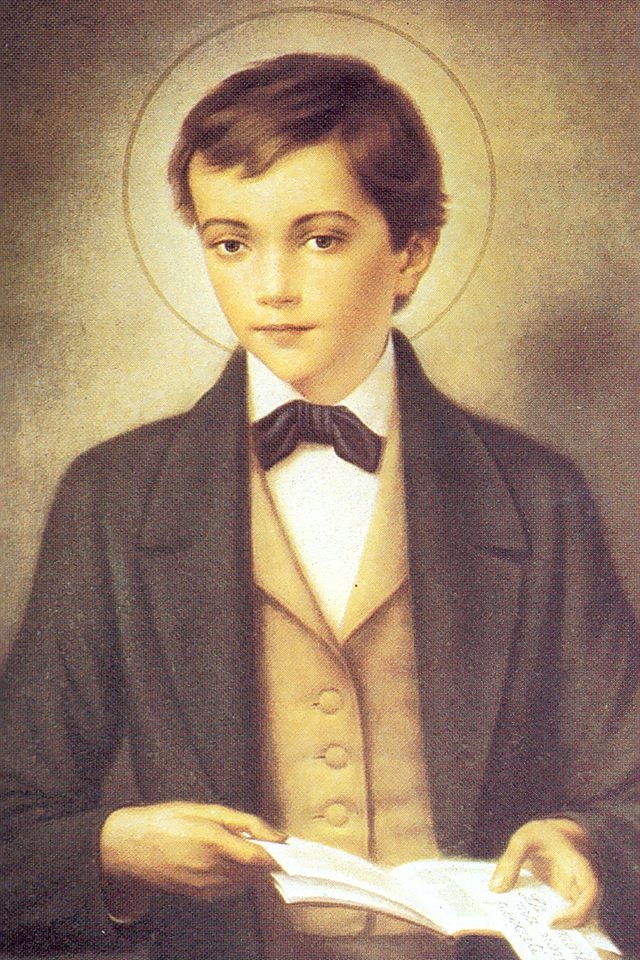
The Life of Dominic Savio By Venerable John Bosco
Chapter XV The Mortification of His External Senses.
Any casual observer of Dominic's outward behaviour would have thought his composure so natural, that it must have been part of his character from birth; but those who were intimately associated with him, and had the care of his education, know very well that it was only gained by long and serious effort, assisted by the grace of God.
To obtain the guard he had over his eyes, he had to make so great and constant an effort, that he once told a friend that his head often ached in consequence of it; but the restraint he had acquired was so complete that no one ever saw him give an unguarded glance, or indulge his sight to the least degree. The eyes are like two windows, he would say, and it depends upon yourself whether you admit an angel or a devil by them.
One day a boy had brought in, doubtless unthinkingly, a paper with some unbecoming pictures in it. A group of boys gathered round to see them, and Dominic thought some sacred pictures were being shown. So he came up to look also; but as soon as he perceived of what nature the pictures were, he was surprised, and taking hold of the paper he tore it into pieces. The boys stood around in silence; then he quietly said: "Our eyes were given to see the beautiful things God has created, and you use them to gaze on such unseemly pictures, provided by the malice of satan for the ruin of souls. Perhaps you have forgotten what you have so often heard, that one evil glance may stain the soul with sin; and yet you indulge your eyes with such objects as that."
Some began to make excuses, but he easily showed them that they were but the snares of the devil, who could draw them on to sin by these means; and in the end no reply could be made to his arguments and recommendations.
To this care of the eyes he joined particular reserve in conversation. He never interrupted anyone who might be speaking, and he often broke off his own sentences in the middle, if another showed that he had something to say. His masters and associates all agree that he was never observed to have said a single idle word, whether in class or in study, or during the fulfilment of any duty. Even when he was the object of unkindness or insults, he had a careful reserve over his words.
One day he had spoken to a companion about a bad habit he had contracted. The latter forgot that this was a kindness, and answered with insults, and even struck and kicked him. Dominic was older and bigger than the other boy, and might easily have returned this treatment; but he sought no revenge but that of Christian charity: at first he became red in the face, but stifling all feeling of resentment he said: "I forgive you; you have done wrong; but do not try that sort of behaviour on others."
In regard to the mortification of all his senses, I shall restrict myself to a few incidents. In winter-time he had a novel way of treating his hands, for he was subject to chilblains, and these he exposed to the cold and wet as much as he could, so as to increase their size and painfulness; he even pricked them to make them smart the more. He thought that he was thus imitating, in a small degree, the wounds inflicted on the person of our Divine Lord. His companions assert that in the very cold weather he went along slowly to school, so as to be exposed to the weather as much as possible.
Wherever there are a number of young people living together, there are sure to be some who are ready with complaints. The arrangements of the house, the discipline, the bed time, and such things, all form the subject of complaint from different persons, and occasionally great disturbances are caused. Savio was quite the opposite of this. He rejoiced if there were something that might be taken exception to, and, particularly in his diet, he was always satisfied and equally pleased.
He was economical to a degree, regarding the food as a gift of God, and therefore not to be despised, even in the smallest way. He was always ready to do a service to others, particularly to the sick, and he eagerly seized occasions for doing this, since his health made him unable to undertake anything of a tiring nature.
Little examples of his mortification, charity, self-forgetfulness, humility, and the like, might easily be multiplied, but these things were part of Dominic's very life, and went to make up that perfect whole which constitutes a pleasing offering in God's sight.
Copyright ©1999-2023 Wildfire Fellowship, Inc all rights reserved

 Keep Site Running
Keep Site Running